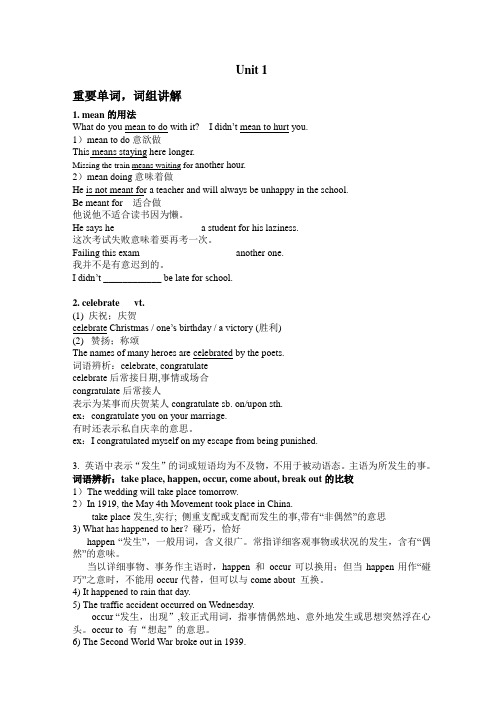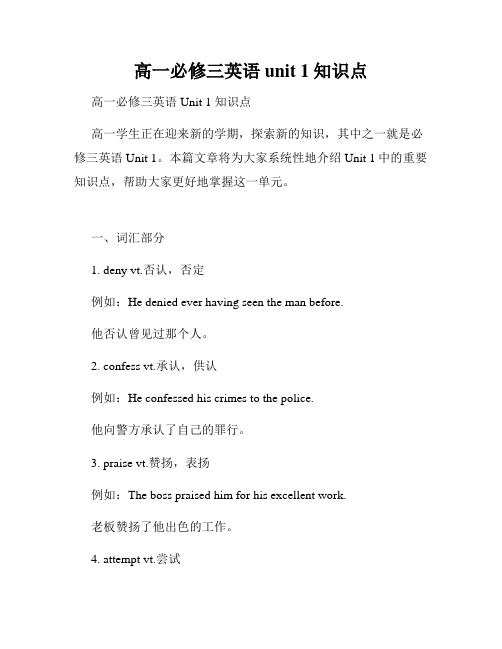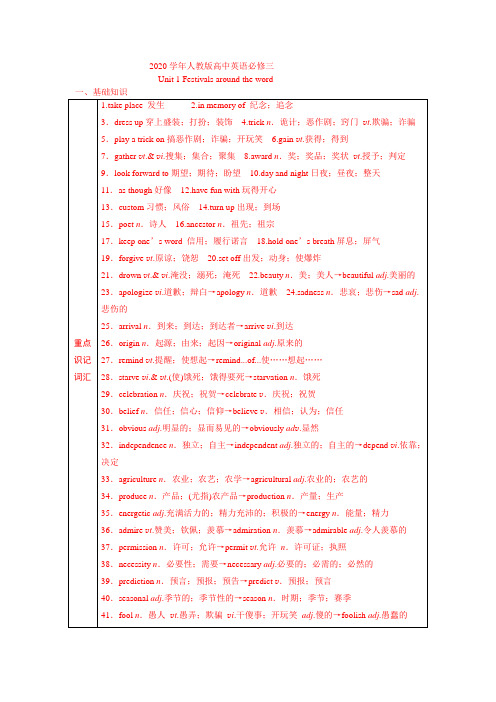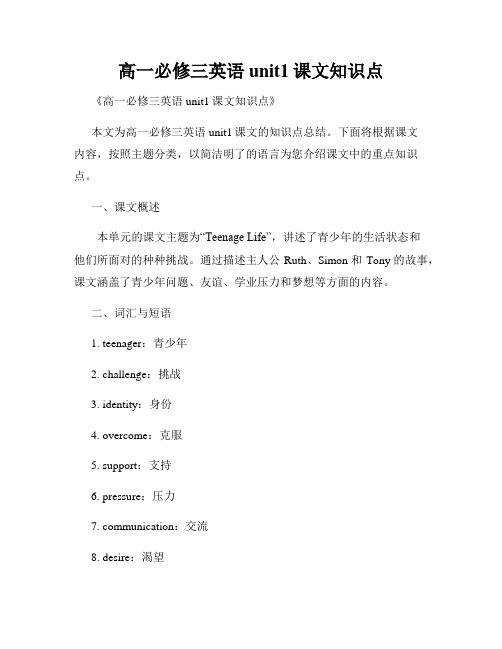必修三Unit1知识点
高一英语必修三第一单元重要知识点讲解(重要词汇-语法等)

Unit 1重要单词,词组讲解1. mean的用法What do you mean to do with it? I didn’t mean to hurt you.1)mean to do意欲做This means staying here longer.Missing the train means waiting for another hour.2)mean doing意味着做He is not meant for a teacher and will always be unhappy in the school.Be meant for 适合做他说他不适合读书因为懒。
He says he _________________ a student for his laziness.这次考试失败意味着要再考一次。
Failing this exam ___________________ another one.我并不是有意迟到的。
I didn’t ____________ be late for school.2. celebrate vt.(1) 庆祝;庆贺celebrate Christmas / one’s birthday / a victory (胜利)(2) 赞扬;称颂The names of many heroes are celebrated by the poets.词语辨析:celebrate, congratulatecelebrate后常接日期,事情或场合congratulate后常接人表示为某事而庆贺某人congratulate sb. on/upon sth.ex:congratulate you on your marriage.有时还表示私自庆幸的意思。
ex:I congratulated myself on my escape from being punished.3. 英语中表示“发生”的词或短语均为不及物,不用于被动语态。
高一必修三英语unit 1知识点

高一必修三英语unit 1知识点高一必修三英语Unit 1 知识点高一学生正在迎来新的学期,探索新的知识,其中之一就是必修三英语Unit 1。
本篇文章将为大家系统性地介绍Unit 1中的重要知识点,帮助大家更好地掌握这一单元。
一、词汇部分1. deny vt.否认,否定例如:He denied ever having seen the man before.他否认曾见过那个人。
2. confess vt.承认,供认例如:He confessed his crimes to the police.他向警方承认了自己的罪行。
3. praise vt.赞扬,表扬例如:The boss praised him for his excellent work.老板赞扬了他出色的工作。
4. attempt vt.尝试例如:He attempted to climb the mountain without any equipment.他试图不带任何装备攀登这座山。
5. hesitate vi.犹豫例如:She hesitated for a moment and then said "yes".她犹豫了一会儿,然后说“是的”。
二、从句部分1. 定语从句定语从句是修饰一个名词或代词的从句,通常使用关系代词或关系副词引导。
注意区分限制性定语从句和非限制性定语从句。
例如:The book that I borrowed from the library is very interesting.我从图书馆借的那本书非常有趣。
2. 时间状语从句时间状语从句用来表示一个动作或事件发生的时间,常用的引导词有when, while, before, after等。
例如:I will call you when I get home.我回家后会给你打电话。
3. 条件状语从句条件状语从句用来表示在某个条件下会发生的动作或事件,常用的引导词有if, unless等。
高一必修三英语unit1单词知识点

高一必修三英语unit1单词知识点Unit 1 Word Knowledge in English for High School FreshmenIntroduction:In the first unit of the English curriculum for high school freshmen, various word knowledge points are introduced. This article aims to provide a comprehensive overview of the key vocabulary and their meanings, as well as their usage in different contexts. Let us delve deeper into the Unit 1 Word Knowledge.1. Nouns:Nouns are words that represent people, places, objects, or concepts. In Unit 1, we encounter several important nouns. For example:- Prototype: refers to an original model or form on which other things are copied or based.- Paradox: denotes a seemingly contradictory statement that may prove to be true upon further examination.2. Verbs:Verbs are action words that express an occurrence, process, or state. Unit 1 covers significant verbs, such as:- Assimilate: means to absorb and integrate information into one's understanding or knowledge.- Validate: implies confirming or establishing the truth, accuracy, or legitimacy of something.3. Adjectives:Adjectives describe or modify nouns, providing additional information about them. In this unit, we come across essential adjectives, including:- Profound: describes something with deep meaning, significance, or impact.- Elusive: portrays something or someone difficult to find, catch, or remember.4. Adverbs:Adverbs enhance the meaning of verbs, adjectives, or other adverbs by providing details about time, manner, place, or degree. Key adverbs in Unit 1 are:- Inevitably: denotes an action or event that cannot be avoided or prevented.- Explicitly: means expressing something clearly, without ambiguity or vagueness.5. Phrasal Verbs:Phrasal verbs are verb phrases comprised of a verb and one or more particles (prepositions or adverbs). In this unit, we encounter significant phrasal verbs, such as:- Set out: refers to starting a journey or task with a particular intention or goal.- Look up: means directing one's gaze upwards or searching for information in a reference source.6. Idioms:Idioms are phrases or expressions whose meanings may differ from the individual words used. Unit 1 introduces idioms that students should be familiar with, for instance:- Break the ice: signifies initiating a conversation or overcoming initial social awkwardness.- A piece of cake: denotes an easy or simple task.Conclusion:Developing a strong grasp of word knowledge is crucial for mastering any language. This article has highlighted key vocabulary in Unit 1 of the high school English curriculum, ranging from nouns and verbs to adjectives, adverbs, phrasal verbs, and idioms. By understanding these words and their usage, students can enhance their overall English proficiency. Keep exploring and practicing these word knowledge points to excel in your English studies!。
高中英语人教版必修三unit1单词,短语,重点句型梳理

Unit 1单词、短语、重点句型梳理重点单词arrival【课文原句】In the USA, Columbus Day is in memory of the arrival of Christopher Columbus in the New World. (Page 2)【点拨】arrival n. 意为"到来;到达"。
如:Mary’s sudden arrival brought us a big surprise.【拓展】★arrival所构成的常用搭配有:on /upon arrival一到达就……;thearrival of……的到来;early / late /new arrival早到/晚到/新来的人。
如:Guests will receive dinner on / upon arrival at the hotel.The arrival of winter can make many people upset.New arrivals were greeted with a warm welcome.★名词arrival是由动词arrive加后缀"-al"构成的。
"-al"在此作名词后缀。
像这样构成的名词还有:refusal (= refuse +后缀"-al") 拒绝;survival (= survive +后缀"-al") 幸存。
【小试牛刀】根据中文提示,用arrival所构成搭配的适当形式完成下列句子。
1. 来晚的人不允许进入剧院。
____________ will not be admitted to the theatre.2. 在这张表格上,你可以标明你希望在你到达的时候有助教去接你。
On the form you may mark that you want a tutor to pick you up __________.3. 自从手机问世以来,电话号码的需求量正在迅速增长。
必修三 Unit 1 Nature in the balance Reading知识点

必修三Unit 1 Reading1.The world ( we live in) is full of natural wonders.(1)natural wonder 自然奇观wonder n.奇迹;奇观;奇妙之处<1> If you wonder about something, you think about it, either because it interests you and you want to know more about it, or because you are worried or suspicious about it.<2>I wondered what that noise was...<3>If you wonder at something, you are very surprised about it or think about it in a very surprised way.<4>He liked to sit and wonder at all that had happened...If you say that it is a wonder that something happened, you mean that it is very surprising and unexpected.<5>It's a wonder that it took almost ten years...(2)be full of 充满.......2.The documentary script below describes the Amazon rainforest, which is home to a wide range of wildlife.(1)documentary script 纪录片脚本(2)describe 描述-description(3)be home to ...的家园/栖息地(4)A wide range of .....各种各样的。
高中英语必修三 unit 1 知识点

III---1 Festivals around the world一、知识点1.Festivals are meant to celebrate important times of year. 节日是用来庆祝一年的重要时光的。
mean doing sth. 意味着mean to do sth. 打算或企图做某事mean sb. to do sth. 打算让某人做某事be meant for 打算作……用;为…而有I believe he is meant to be a soldier.我相信他天生是要当军人的。
2. Discuss when they take place and what people do at that time. take place发生,举行take the place of代替,替代3. the beauty of the full moon 满月的美4. watch the full moon with family and friends和家人、朋友一起看满月5. Some festivals are held to honour the dead or to satisfy the ancestors, who might return either to help or to do harm. 有些节日,是为了纪念死者,或使祖先得到满足,因为祖先们有可能回到世上给人们提供帮助,也有可能带来危害。
to return to London 回到伦敦Return the book to the library. 把书归还给图书馆。
On my return from work, I saw the door was open. 我下班回家时,看见门开着。
6. …go to clean graves and light incense in memory of their ancestors…….去上坟、扫墓、烧香,以缅怀祖先。
2020学年人教版高中英语必修三Unit1知识点归纳总结

2020学年人教版高中英语必修三Unit 1 Festivals around the word二、重点单词突破1 satisfy v.使满意,使满足;满足(需求、需要等)[应试指导]写作高分句式:What satisfied sb.is that...替换to one’s satisfaction他对赢得比赛感到满意。
[夯实基础](1)用satisfy的适当形式填空①None of these is particularly satisfying.②We are not satisfied with these results.③Both sides expressed satisfaction with the progress so far.④We just can’t find enough good second-hand cars to satisfy demands.⑤From his satisfied voice on the phone I know everything is going under way.(2)The teacher was satisfied with his test results and praised him.Satisfied with his test results,the teacher praised him.(用过去分词作状语改写句子)2dress v.给……穿衣;穿着;打扮;n.衣裙;女装;衣服[应试指导]过去分词作定语、状语的考查休穿戴整洁地上班去了。
The boys were all dressed up as pirates.这些男孩子都装扮成了海盗。
[词义辨析]wear,have on,dress,put on(1)wear和have on表示“穿着”的状态,wear同时表示“佩戴”,并可以用于进行时,后还可以跟表示颜色的名词,而have on不行。
高一必修三英语unit1课文知识点

高一必修三英语unit1课文知识点《高一必修三英语unit1课文知识点》本文为高一必修三英语unit1课文的知识点总结。
下面将根据课文内容,按照主题分类,以简洁明了的语言为您介绍课文中的重点知识点。
一、课文概述本单元的课文主题为“Teenage Life”,讲述了青少年的生活状态和他们所面对的种种挑战。
通过描述主人公Ruth、Simon和Tony的故事,课文涵盖了青少年问题、友谊、学业压力和梦想等方面的内容。
二、词汇与短语1. teenager:青少年2. challenge:挑战3. identity:身份4. overcome:克服5. support:支持6. pressure:压力7. communication:交流8. desire:渴望9. ambition:雄心;抱负10. future prospects:未来前景11. put effort into:努力去做某事12. dream of:梦想13. have confidence in:对...有信心14. face difficulties:面对困难15. be under pressure:承受压力16. build up relationships:建立关系17. achieve success:取得成功三、语法要点1. 一般现在时:用于描述事实、经常性行为或客观真理。
例如:Teenagers face many challenges in their lives.2. 一般过去时:用于描述完成的动作或过去发生的事情。
例如:Ruth wanted to be a doctor when she was young.3. 情态动词can:表达能力或可能性。
例如:Simon can speak three languages fluently.4. 情态动词should:表示应该或建议。
例如:You should have confidence in yourself.5. not...until...:表示直到某个时间或情况才发生或完成。
- 1、下载文档前请自行甄别文档内容的完整性,平台不提供额外的编辑、内容补充、找答案等附加服务。
- 2、"仅部分预览"的文档,不可在线预览部分如存在完整性等问题,可反馈申请退款(可完整预览的文档不适用该条件!)。
- 3、如文档侵犯您的权益,请联系客服反馈,我们会尽快为您处理(人工客服工作时间:9:00-18:30)。
必修三Unit1知识点Unit 11. mean的用法1)mean to do意欲做 e.g. I didn’t mean to hurt you.2)mean doing意味着 e.g. Missing the train means waiting for another hour.3) be meant for 适合做e.g. He is not meant for a teacher and will always be unhappy in the school. means 方式,方法,途径by all means 当然可以,没问题by no means 绝不by means of 借助……手段;依靠……方法练习:他说他不适合读书因为懒。
He says he _______a student for his laziness. 这次考试失败意味着要再考一次。
Failing this exam _______________another one.我并不是故意迟到的。
I didn’t ____________ be l ate for school.2. celebrate vt. & vi.(1) 庆祝;祝贺celebrate Christmas / one’s birthday / a victory (成功)(2) 赞扬;称颂 e.g. The names of many heroes are celebrated by the poets. 词语辨析:celebrate, congratulatecelebrate表示“庆祝”后常接日期,事情或场合,表示“赞扬”时,宾语可以是人,也可是物。
congratulate后常接人,表示向某人祝贺congratulate sb. on/upon (doing) sth.congratulations (to sb) on sth/ doing sth.3. 英语中表示“发生”的词或短语均为不及物,不用于被动语态,主语为所发生的事。
词语辨析:take place, happen, occur, come about, break out的比较1)take place“发生,举行”侧重安排或计划而发生的事,带有“非偶然”的意思e.g. Great changes have taken place in China in the past 10 years.2) happen “发生”常指具体客观事物或情况的偶然或未能预见地发生。
happen 还可以表示“碰巧发生了什么事”常构成sb/sth. happens to do或It happens that…e.g. It happened to rain that day.The traffic accident occurred on Wednesday.3)occur “发生,出现”,较正式用词,指事情偶然地、意外地发生或思想突然浮在心头。
occur to 有“想起”的意思。
e.g. A good idea occurred to me.4)break out (火灾、战争、疾病)突然发生、爆发e.g. The Second World War broke out in 1939.5)come about “发生”, 往往注重事情发生的原因。
且很多时候与how 连用。
与happen 用法较接近e.g. How does it come about that you were caught by the police?练习:用take place , happen 和come about 的正确形式填空1.The May 4th Movement _____________ in 1919.2.If anything ___________ to the machine, let me know at once.3.The opening day of the play ___________ tomorrow night.4.Can you tell me how it ___________?4.starve: vt.使饿死vi.饿得要死starve to deathbe starved of/ starve for: 渴望n. starvation饿死:die of starvatione.g. The motherless children were starved of/ were starving for affection.练习:他们在沙漠中迷路而饿死。
They got lost in the desert and _______________.他们正急需一大笔钱来完成工作。
They are ___a sum of money to finish their work.5. honor 1) n. 光荣,荣誉;光荣的人或事情e.g. They fight for the honor of the country.Liu Xiang is an honor to our country.2) 尊敬,给以荣誉(v) e.g. Children should honor their parents.3) in honor of 为了纪念do sb. honor/ do honor to sb. 向某人致敬on one’s honor 以人格担保have the honor of doing/ to do sth. 有幸做…6. satisfy vt. / vi.使满意,使满足e.g. Nothing can satisfy him except the best.Some people are really hard to satisfy.sb. be satisfied with 对…满意 e.g. She’s not satisfied with her new house.令人满意的: satisfying, satisfactory 满意:satisfaction7. harm n./v. 损害;伤害do sb harm =do harm to sb=harm sb 反:do sb goode.g. He meant no harm to you.The events has harmed the relations between the two countries.8. in memory of 为纪念e.g. The museum was built in memory of the famous scientist.in praise of 歌颂in charge of 负责;掌管in search of 寻找in favor of 支持in celebration of 庆祝in support of 支持in place of 代替in case of 如果;万一9. They offer food, flowers and gift….词语辨析:offer, provide, supplyoffer 主动提供。
offer sth to sb/ offer sb sthprovide 供给(所需物,尤指生活必需品)。
provide sth (for sb)/ provide sb with sth.supply: 供应(所需要或所要求之物)。
supply sth to sb; supply sb with sth练习:When I meet difficulty, my roommates will _____me help.They _______a reward for the return of the lost jewels.The government need to _________these old people with food and clothes.Electricity should be _________enough every month.10. dress up 盛装打扮;装扮,装饰e.g. You don’t have to dress up. Come as you are.Children love dressing up in Halloween.dress vt. 给…穿衣dress oneself/ sb. 给自己/某人穿衣表示动作be dressed in…表示状态11.play a trick on sb.= play tricks on sb. 捉弄某人;开某人的玩笑相近短语:make fun of 取笑,捉弄laugh at 嘲笑make a fool of愚弄play a joke with= joke with和某人开玩笑trick vt. trick sb into sth./ doing sth. 诱使某人干某事trick sb. out of sth. 从某人处骗走某物12 award n. 奖品,奖项,奖金e.g. She showed us the awards she had won.vt. 授予; 判定award sb sth= award sth to sbe.g. The judges awarded both teams equal points.award “奖,奖品,奖金”, 侧重经过正式裁定而得到的prize “奖,奖金”, 指在比赛中获胜或有特殊贡献时所得的奖励reward 回报,报酬13. admire vt. 赞美;钦佩;羡慕admire sb/sth (for …)为某事钦佩某人 e.g. I admire him for his success in business.admiration n. admirable adj.14. look forward to(介词) + n/ v-ing 盼望,期待e.g. I’m looking forward to his coming.以下短语中的to也为介词,后面加doing,而不是dopay attention to 注意devote…to 致力于prefer to 更加喜欢get down to 开始做be used to 习惯于15. as though= as if 好像,仿佛(其引导的从句中的谓语动词即可用陈述语气,也可用虚拟语气)1)虚拟语气(其谓语若与现在事实相反,用一般过去时,be动词用were;若与过去事实相反,则用过去完成时)e.g. He behaved as if/ though nothing had happened.He talks as if/though he knew everything.2). 陈述语气(表示很可能的事实就用陈述语气)e.g. It looks as if/ though it is going to rain.He waved to me as if to tell me something.16. custom 指传统风俗、习俗,也可指个人生活习惯。
